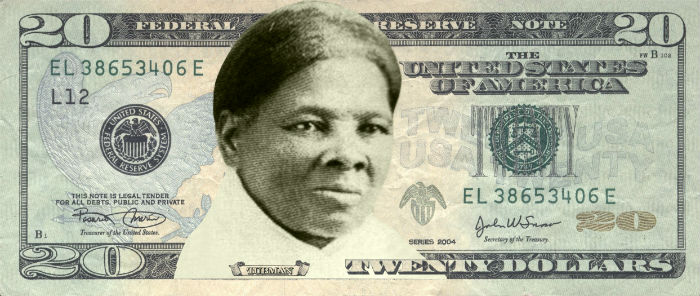Harriet Tubman to be first female featured on $20 bill
Harriet Tubman will replace Andrew Jackson as the face of the $20 bill in 2020. Concept art courtesy of “Women on 20s.”
Harriet Tubman will be the first female and African-American to be featured on U.S. currency. She will replace Andrew Jackson on the front of the new $20 bill.
The change will be available by the year 2020 to celebrate the 100th anniversary of the 19th Amendment, which granted women the right to vote in the U.S.
This historical event was brought on by the campaign known as “Women on 20s.” The American public had the opportunity to vote for a female historical figure to be placed on the new $20 bill.
Out of the 600,000 people that participated in the survey, Tubman was announced the winner over other female historical figures such as Eleanor Roosevelt, Rosa Parks and Wilma Mankiller, the first female chief of the Cherokee Nation.
Seve Christian, junior multicultural and gender studies and comparative religion major, is this semester’s transgender program coordinator for the Gender and Sexuality Equality Center. Christian said the change brings attention to oppression.

“It’s time to make way for people that were dealing with a lot of different oppressions, because the system we live in, it’s very male driven, it’s very white driven,” Christian said.
Placing Tubman on the $20 bill gives a historic female figure representation, but it also recognized the history of African-Americans gaining freedom from slavery.
Senior sociology major and director of GSEC eliza dyer explained how this was a great step in the recognition of women and blacks. However, dyer believes America has a long way to go when representing minorities.

“I think black women struggle a lot with visibility, particularly the types of visibility they are allowed can be destructive, so I think the fact we are having visible black women with such a legacy can be really powerful,” dyer said.
However, the new $20 bill design has had some controversy because Tubman was not a U.S. president.
Dylan Gray, a sophomore political science major and intern for the Cross Cultural Leadership Center, is excited about the new $20 bill because Tubman is a huge symbol of hope. He feels she was greater than some of the past U.S. presidents.

“These founding fathers are writing ‘every man has a right to life, liberty and happiness’ while owning slaves. That’s controversial in itself,” he said. “People always like to brush this under the rug. Like, ‘why are we talking about this, it’s in the past.’ But the past has so much effect on where we are at today.”
Andrew Jackson, the seventh U.S. president has been featured on the bill since 1928. Jackson will still remain on the back of the $20 while Tubman would be on the front. However, this adds some irony since Jackson not only owned slaves but created an Indian removal policy that led to The Trail of Tears.
Tracey Butts, head of the English department, believes this historic change will give people room to talk about such topics as slavery, the treatment of blacks, women and people who are less visible in America.

“All these founding fathers found it important to have their freedom from Great Britain and have representation and not be treated as ‘slaves,'” Butts said. “There’s that constant reminder of that hypocrisy that existed in this country and how we treated people based on no reason other than the fact their skin was black.”
Butts said this hypocrisy is still relevant in how American society treats transgender people and other minority groups.
“We can tie this into how we treat transgender people and whether or not they should be allowed to use the bathrooms or people we perceive as immigrants when we are a country of immigrants … the same way we treat women. The way we treat people based on something they can’t control,” she said.
Tubman, who escaped slavery in 1849, became a leading abolitionist to help other slaves escape captivity. She helped hundreds of slaves escape to freedom through the Underground Railroad before the Civil War. During the war, Tubman became an armed scout and spy and she successfully liberated 700 slaves in South Carolina. Tubman continues to inspire a new generation of Americans struggling for civil rights.
Bridget Comito can be reached at [email protected] or @bcineg1992 on Twitter.









Compaore Raphael // May 11, 2016 at 10:06 am
Affectueusement…
Barbara Ortiz Howard // May 11, 2016 at 9:29 am
A note of appreciation for this article .We are such a funny country , that there always have to be folks who will disparage just about anything. We have those that criticize the Tubman $20 as being “politically correct” while others question whether Harriet Tubman would want to be on money, or that this is meaningless change. The reactions of your fellow students, like most of what we have heard, is a testament that the impact of seeing this courageous freedom fighter on our ubiquitous $20 is inspiring and uplifting for all of humanity and helps us consider how to be a better world. It is very important to validate the possibility of such positivity from even the prospect of the Tubman $20, and we would encourage everyone to speak what this change means to them. Thanks for working to make dreams reality…though a work always in progress, we must as Harriet urged: Keep Going!
Melissa Peckham // May 11, 2016 at 8:37 am
For those who think the image on a bill must be that of a president, please note that neither Alexander Hamilton ($10 bill) nor Benjamin Franklin ($100 bill) were ever president.